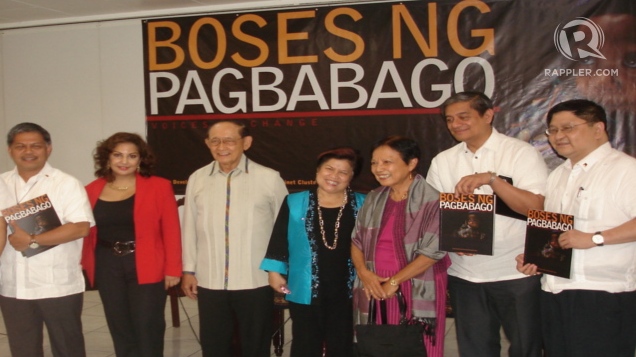SUMMARY
This is AI generated summarization, which may have errors. For context, always refer to the full article.
03022013.jpg)
MANILA, Philippines – It is not unusual for government to exaggerate the gains of its implemented projects.
The pioneering publication of the Human Development and Poverty Reduction Cabinet Cluster (HDPRCC) does the exact opposite. The book entitled, “Boses ng Pagbabago” (Voices of Change) contains stories of 18 Filipinos living in poverty who, primarily through their own efforts and with the help of government, are slowly transcending the boundaries set by the birth lottery.
There is a great deal of hope that the text provides, revealing in each story a Juan dela Cruz who may have, at one point in his life, had to tell himself to stop with the whining and act on what needs to be acted upon.
They are not passive recipients of government benefits. They are citizens who are aware government aid can only go so far, and the rest is almost always up to them.
Individual stories
There is Bec, a 56-year-old visually impaired worker at the Department of Education central office, who was tutored at a young age by SPED-trained teachers Gerardo Consolacion and Ricardo Monegro.
The focused mentoring helped her cultivate a love for learning as she eventually earned her Bachelor of Arts degree from the Central Philippine University in Iloilo City. For over 30 years now, she has devoted her life preparing Braille materials for visually-impaired students in public schools.
There is also 54-year-old farmer Bert of Sierra Bullones, Bohol whose lack of education was no hindrance to his dream of a better life for his family. His desire to familiarize himself with various farming techniques led him to participate in the training programs provided by the Department of Agrarian Reform (DAR) and other agencies.
The various training Bert attended cultivated his preference for fertilizer from animal manure over the costlier chemical-based alternatives. He has, since then, used and advocated for organic farming in Bohol.
.jpg)
These are people who, despite the hardship brought by destitution and disability, refused to use illegal means to survive and instead made themselves available for service to the country in their own little way. They are people who played by the government’s rules – the rule of law – and benefited in return.
There is a term for it, and it is called “trust.” It is the acknowledgment that social mobility is possible through the coordinated efforts of government and civil society.
The book, by virtue of inherent limitations in form and volume, fails to document the thousand other Filipinos fighting their way through bureaucratic hurdles and “falling through the cracks.” Then again, that is not what the book is for.
It makes no mention, for instance, of those on the opposite side of the spectrum: people who have abandoned all hope. This is precisely because the stories featured are meant to build trust and a resolve to overcome poverty.
Eliminating poverty: a long way to go
Triumph in wealth is not the story ending of the narratives outlined in the publication. All the featured beneficiaries are still in the process of overcoming. Some, like the 48 rice farmers of the Hungduan Farmers Federation in the Cordillera Administrative Region, are still awaiting assistance from the government for greater access to modern farming machinery. They especially need it, considering the growing American market of the local rice variety Mina-Angan.
Bert, the 54-year-old farmer from Bohol, has already received his land covered by the Comprehensive Agrarian Reform Program (CARP). There are countless others who have not, and whose cases are pending before the high court.
Asst Secretary Lila Ramos-Shahani, HDPRCC communications head and Boses ng Pagbabago editor, said that she will in the future write about those who “never got aid.”
“…It is a crucial limitation of the book. One day, I hope to have the time and the funds to write a rigorous and fair examination of those who did fall through the cracks and why…for policy and analytical purposes,” she said.
Raising the bar for the social necessities that are inextricably linked to poverty – income-generation and employment opportunities, quality of education and technical skills training, access to quality and affordable health care, among others – cannot be done overnight.
The 18 stories narrated in “Voices of Change” are proof that there are people willing to give of themselves, if only the government consistently fulfills its end of the bargain. – Rappler.com
Add a comment
How does this make you feel?

There are no comments yet. Add your comment to start the conversation.